The Searchers (1956)
Dir. John Ford
Writ. Frank S.Nugent, based on the novel by Alan LeMay
w/ John Wayne, Vera Miles, Jeffrey S. Hunter, Ward Bond, Natalie Wood
There's something hard enough about raising a family that somehow augments the difficulty of doing so in the pioneer days. Perhaps that's the real reason why Western-settling independent types have often been so glorified and romanticized in these films. Most Americans can claim some amount of ancestry that fits that mold, so especially in the Cold War days of bomb shelders and emergency raid drills there was a public demand for movies that reinforced the strength and spirit of what came to embody "the American way". Since this was before "white guilt", there aren't any apologies made to the Native American peoples who are depicted here more as a source of conflict than as a people with a viable culture, history, or human emotions of their own. It's almost embarrassing to watch a film like this in which so many mistakes are made regarding the Comanche that the lack of research or responsibility on the part of the filmmaker is pretty damned appalling; or, more often, just really gauche. That being said, this movie doesn't exist to enlighten its audience regarding the ways of an all but extinct race, but to provide a venue in which John Wayne can shine. So all political and cultural faux pas aside, for serious Wayne fans, this is a must-see.
In this sweeping vision from John Ford, the Duke is afforded several opportunities to act, and act he does. The script, while it is very racist and pro-pioneer, seems disinclined to completely dismiss the influence of the indigenous tribes on the folks of that time. People who have been taken by raiders are shown in various debilitated states of being, a village idiot type named Mose wanders around the plains imitating and revering the very people who threaten his fellows, and the mixed blood that was fairly common among early settlers is more than acknowledged. His riding buddy for most of the movie, Martin Paulie, one-eighth Cherokee, provides the grit that abraises Wayne's character, Ethan, as his stubborness to accept the Indians as human manifests itself plainly. This also provides occasions for stock Wayne one-liners like, "That'll be the day."
Ford essentially broke this up into two basic stages: the indoors, in which a play-like atmosphere creates somber moods in which the family reacts to eminent, unseeable threats, and the outdoors (most of which are real) where all the action and the chasing of those same unseeable aggressors takes place. When Debbie is taken by a raiding chief, the chase is on. True to form, one thing that Ford should be lauded for is for not failing to depict another predator that the white man faced in those bleak times: other white men. Ethan has his hands full making sure that he and Martin don't end up shot in the back by money-hungry would-be assassins while they're tracking down the ghost war chief, Scar, who seems to have materialized out of the mists of hear-say.
The indoor sets revel in the colors of sunset and dusk, while the outdoor shots alternate between the formidable buttes and plateaus of Texas and simpler, quieter stretches of woods and snow. Since most Westerns bothered very little in the way of cinematography, the efforts are pretty pleasing even if the story suffers from time to time. The encapsulation of Wayne's hero as a man who does not stop until he gets what he wants, however, doesn't suffer in the slightest. From the moment he steps foot onto the set, to the moment he walks away from the porch, he is a lonely and austere figure, the epitome of wild and fierce independence in an uncertain and unpredictable world. And yes, when he scoops up the now-grown Debbie in his arms instead of killing her, there is a huge, undeniable sense of redemptive value.
Perhaps Ethan realizes that blood is blood, and that he has enough on his hands already without resorting to the sort of animal behavior he's always been so hard-set against. He's no hypocrite. He has a beating heart inside that staggering frame. And thanks to years of perseverance, so does Debbie.
Writ. Frank S.Nugent, based on the novel by Alan LeMay
w/ John Wayne, Vera Miles, Jeffrey S. Hunter, Ward Bond, Natalie Wood
There's something hard enough about raising a family that somehow augments the difficulty of doing so in the pioneer days. Perhaps that's the real reason why Western-settling independent types have often been so glorified and romanticized in these films. Most Americans can claim some amount of ancestry that fits that mold, so especially in the Cold War days of bomb shelders and emergency raid drills there was a public demand for movies that reinforced the strength and spirit of what came to embody "the American way". Since this was before "white guilt", there aren't any apologies made to the Native American peoples who are depicted here more as a source of conflict than as a people with a viable culture, history, or human emotions of their own. It's almost embarrassing to watch a film like this in which so many mistakes are made regarding the Comanche that the lack of research or responsibility on the part of the filmmaker is pretty damned appalling; or, more often, just really gauche. That being said, this movie doesn't exist to enlighten its audience regarding the ways of an all but extinct race, but to provide a venue in which John Wayne can shine. So all political and cultural faux pas aside, for serious Wayne fans, this is a must-see.
In this sweeping vision from John Ford, the Duke is afforded several opportunities to act, and act he does. The script, while it is very racist and pro-pioneer, seems disinclined to completely dismiss the influence of the indigenous tribes on the folks of that time. People who have been taken by raiders are shown in various debilitated states of being, a village idiot type named Mose wanders around the plains imitating and revering the very people who threaten his fellows, and the mixed blood that was fairly common among early settlers is more than acknowledged. His riding buddy for most of the movie, Martin Paulie, one-eighth Cherokee, provides the grit that abraises Wayne's character, Ethan, as his stubborness to accept the Indians as human manifests itself plainly. This also provides occasions for stock Wayne one-liners like, "That'll be the day."
Ford essentially broke this up into two basic stages: the indoors, in which a play-like atmosphere creates somber moods in which the family reacts to eminent, unseeable threats, and the outdoors (most of which are real) where all the action and the chasing of those same unseeable aggressors takes place. When Debbie is taken by a raiding chief, the chase is on. True to form, one thing that Ford should be lauded for is for not failing to depict another predator that the white man faced in those bleak times: other white men. Ethan has his hands full making sure that he and Martin don't end up shot in the back by money-hungry would-be assassins while they're tracking down the ghost war chief, Scar, who seems to have materialized out of the mists of hear-say.
The indoor sets revel in the colors of sunset and dusk, while the outdoor shots alternate between the formidable buttes and plateaus of Texas and simpler, quieter stretches of woods and snow. Since most Westerns bothered very little in the way of cinematography, the efforts are pretty pleasing even if the story suffers from time to time. The encapsulation of Wayne's hero as a man who does not stop until he gets what he wants, however, doesn't suffer in the slightest. From the moment he steps foot onto the set, to the moment he walks away from the porch, he is a lonely and austere figure, the epitome of wild and fierce independence in an uncertain and unpredictable world. And yes, when he scoops up the now-grown Debbie in his arms instead of killing her, there is a huge, undeniable sense of redemptive value.
Perhaps Ethan realizes that blood is blood, and that he has enough on his hands already without resorting to the sort of animal behavior he's always been so hard-set against. He's no hypocrite. He has a beating heart inside that staggering frame. And thanks to years of perseverance, so does Debbie.
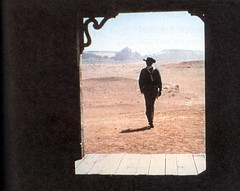

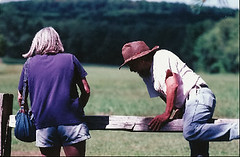
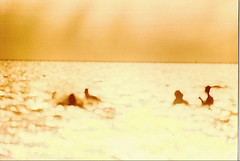
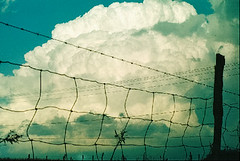
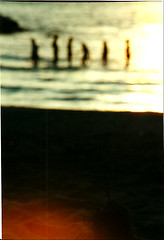
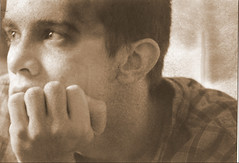
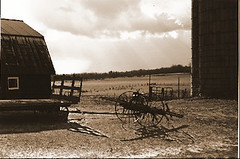
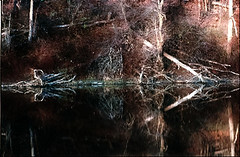






0 Comments:
Post a Comment
<< Home